
The UAE has a 30-year, $163-billion vision to become a global hub for a green economy
UAE: For the first time in the survey’s history, the World Economic Forum report 2020 “Nature Risk Rising” stated the five biggest current global risks are all environmental – namely extreme weather events, human-made environmental damage, human-made disasters, major biodiversity loss, and natural disasters.
The findings emphasise the need for collaboration between businesses and policymakers to stop severe threats to the climate, environment, public health and technology systems.
The term “green economy” has undoubtedly become a buzzword as of late, but what exactly does it connote? A green economy is low-carbon, resource-efficient and socially inclusive. In it, prosperity is driven by public and private investment into a wide range of economic activities. These include infrastructure and assets that allow reduced carbon emissions and pollution, solutions that deliver enhanced energy and resource efficiency and guard against the loss of biodiversity and ecosystem services.
Over the years, companies have grown increasingly aware that climate mitigation is vital for the future stability of business operations. The greatest risk for businesses is to act complacently. Businesses can accelerate the transition to a green economy by aligning their investments with climate change adaption and mitigation opportunities.
This transition is well underway in the UAE. In January 2012, HH Sheikh Mohammed bin Rashid Al Maktoum, Vice -President and Prime Minister of the UAE and Ruler of Dubai, launched the Green Economy initiative under the slogan “A Green Economy for Sustainable Development”. Under this initiative, the UAE seeks to become a global hub and a model of a green economy, to enhance the country’s competitiveness and sustainability and preserve its environment for future generations.
In 2015, Sheikh Mohammed bin Rashid Al Maktoum announced the Dubai Clean Energy Strategy 2050 as part of the UAE’s $163 billion investment in alternative energy over the next three decades. This aims to increase renewable energy’s share of UAE power consumption from 25% to 44% by 2050. The country is also striving to increase energy efficiency by 40% over the same period. Taking ambitious action now will allow companies to stay ahead of future policies and regulations to limit GHG emissions.
In 2017, the UAE launched the National Climate Change Plan which outlines the nation’s comprehensive framework to address the causes and impacts of climate change and achieve a better quality of life. While the government is paving the way towards a green economy, businesses must help the nation achieve its climate goals too.
To support businesses in their journey towards a green economy, Emirates Nature- WWF has launched its Target Climate initiative in partnership with the Ministry of Climate Change and Environment, HSBC Bank, Environment Agency-Abu Dhabi and Dubai Chamber.
Working side-by-side with policymakers, Emirates Nature-WWF will drive businesses and the community to pursue the green economy. The initiative will offer UAE businesses the opportunity to become leaders in this fast-growing sector with free access to global expertise, local knowledge, exclusive training events and valuable resources.



